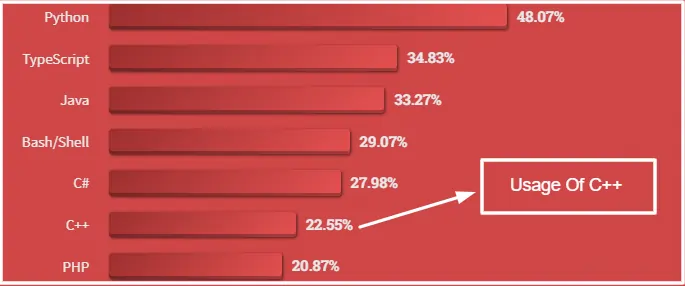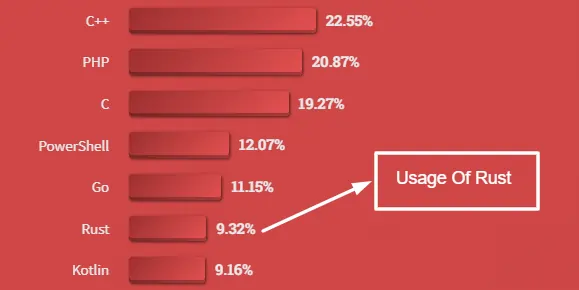Currently, you know very well it is difficult to find a good job. Computer science is the only field that provides a better opportunity for students. It also encourages the student’s skills with other latest programming languages.
Javascript, Rust, Java, C++, C, TypeScript, etc. All these are the best programming languages of 2023 that help students to get various jobs in this field. If you would like to compare rust vs C++, javascript vs typescript, and HTML vs CSS, then you will find that all the programming languages slightly differ from each other.
However, all of the languages are good to learn. C++ is used to develop browsers, data structures, operating systems, software engineering, applications, in-game programming, etc. On the other hand, the rust is used to support system-level programmers who write byte-tweaking, low-level code.
Let’s know more differences between rust vs C++ and the reasons for choosing both.
What is Rust?
Table of Contents
Rust is a system-level programming language created by Mozilla in 2010. And its purpose of creation is to outperform C++ in terms of efficiency and safety. It’s specially designed to deal with challenges that C++ has never been perfect at, like inefficiencies related to memory and concurrent programming. Rust is quite similar to C++ in terms of syntax, but it appears to be more “loveable”, which means it’s more suitable and adaptable than others. Therefore, many developers have used it instead of C++ for their projects.
It is classified as a low-level language because it has precise control capabilities, mainly manual memory management. Furthermore, Rust generates the smallest binary feasible and builds quickly with little overhead. It was utilised in the Mozilla Firefox browser development, and without using the garbage collection methods, it assures a more secure memory management technique.
What Major Companies Use Rust?
Rust is used in production by both large and small companies, including
- Mozilla
- Dropbox
- Npm
- Postmates
- Braintree, and others.
What is C++?
In 1985, Bjarne Stroustrup created C++, an object-oriented programming language. It improved the C language’s notion, creating a so-called “C with Classes,” which was a groundbreaking solution some decades ago. C++ was supposed to be a very powerful system programming tool: literally, the bulk of Microsoft products, including the “epic” software packages Windows 95, 98, ME, 200, and XP, were built using different editions of Visual C++ (or just C++).
C++, being an object-oriented programming language, provides a defined structure of the code, permits code module reusability, and is recognised for its quick speed. Furthermore, it is a multi-purpose language, which means it can be used to create a broad range of products ranging from resource-constrained software and basic graphical user interface programmes to rich 3D graphics, desktop games, and strong business packages. C++ is favoured by programmers for its broad capabilities, as well as its efficiency and flexibility.
What Major Companies Use C++?
Well-known technology companies and organisations that use C++ including
- Evernote
- Microsoft
- Opera
- NASA

Usage Of C++ & Rust In 2023
Below we discuss the usage of C++.

The usage of C++ is around 22.55%. In 2023, the best programming languages in the world are Javascript, HTML/CSS, SQL, Python, Typescript, Bash/shell, C#, C++, PHP, etc. C++ is a general-purpose, high-level programming language. These are the main reasons behind using or learning C++. It is such as;

Rust Vs C++: The Key Differences
There are so many differences between Rust vs C++. And some of them that are the important ones and the top differences between Rust vs C++ are given below:
Ease of use
Most programmers who utilise both Rust and C++ believe that Rust is easier to use due to its well-defined semantics and ability to avoid undesirable behaviour. C++ has so many features that it might be tough to keep track of them all.
Performance
Because of its greater safety requirements and lower development costs, Rust facilitates higher-level performance compared to C++. At the same time, one of the main differences is that makes Rust safer than C++ is that code flaws can cause compilation issues rather than run-time errors.
For example, C++ lacks automated garbage collection tools to ensure speedier operation, contributing to various run-time issues. On the other hand, C++ may achieve peak performance and develop incredibly fast applications with less time spent on code compilation and execution due to its massive standard codebase (STL-library), which can fill numerous gaps when used by an expert C++ engineer.
Pointers
If we talk about the pointer in computer science, a pointer is an object that stores a memory address. The address can also be said “points to” data elsewhere in the programme. Smart pointers are data structures that include additional functionality and metadata. Almost all low-level and high-level languages have pointer capability.
In C++, the std::shared_ptr and std::unique_ptr types can be used as smart pointers. One of the smart pointer types in Rust’s standard library is the reference counting smart pointer. Both C++ and Rust make heavy use of smart pointers in the form of objects (std::string in C++ and String in Rust), which bring a slew of other benefits.
Quality And Coding Speed
C++ is a dynamically typed language. There are few safeguards to avoid code mistakes and identify problems before compiling the entire programme. Rust is renowned as a statically-typed language with many extra features, which is why its code validation process is far more rigid than C++’s. Rust has a very attentive attitude toward code quality/security, which is one of Rust’s primary benefits over C++ and why many programmers prefer it.
Many developers who write code in Rust say that the development process is clearly more pleasant due to enriched semantics and a well-functioning system that takes care of unwanted behaviour avoidance. It is more difficult to avoid undefined behaviour in C++ since it prioritises the speed of operation above such characteristics. However, writing code in Rust, like C++, may be challenging for newbies since both are system-level languages that are complex ones. And it allows you to study and manage the underlying computing process behind the scenes.
Compile Time
Both Rust, as well as C++ approximately takes the same amount of time to compile, depending on how many templates a C++ project implements. The compilation will be slowed as more templates are added. In general, the incremental compilation is more efficient in C++. Rust’s compiler is well-known for its friendliness. It includes good tools and error messages that are suitable.
Game Development
If we talk about C++, then it is now the most popular game development language. The Unreal Engine, written in C++, is a fascinating game creation framework. The Unreal Engine is a well-known, mature, and sophisticated engine. Rust is a relatively new addition to the game development world. However, it lacks the power of C++ frameworks. Without a doubt, Rust can be used to make games, but it will take a long time for it to match C++’s capability in this field. However, if more Rust developers contribute to its environment, it may become more competitive.
Extensibility
C++ has been a popular programming language for decades, and it comes with a plethora of frameworks and libraries. Compared to C++, Rust still appears immature: it has a tiny standard library and few possibilities for extending its capabilities. Although Rust lacks in the frameworks and extensions availability, the good news is that the language is still improving rapidly, and the community is fast expanding.
Reasons To Choose C++
These are many reasons to choose C++.
1. Provides Better Options For Career
C++ provides various job opportunities with a high-salary package and better options for the student’s career. The average salary of the C++ web developer in 2023 is around $118,305. These are many career opportunities with the average salaries you can get after learning C++.
C++ Programming Jobs Salary
| Job Opportunities | Average Salary (per year) |
| 1. C++ programmer | $108,820 |
| 2. Game Programmer | $65756 |
| 3. Junior Programmer | $52,632 |
| 4. Senior Programmer | $94284 |
| 5. Software Developer | $120,730 |
| 6. Software Developer Engineer | $95,852 |
| 7. Quality Analyst | $84,113 |
| 8. C++ Analyst | $118,480 |
2. Best To Develop Latest Games
The main reason to choose C++ is that by learning C++, you can develop various games with C++. These are the C++ most popular games such as;
| Game Engine | Famous Games | Platform(s) |
| 1. Antiryad Gx | The Sacred Armour of Antiriad | iOS, Android, Windows, Linux, DOS, Mac OS, MorphOS, NACL, AmigaOS, AROS |
| 2. 4A Engine | Metro 2033 Metro Redux Metro: Last Night Arktika.1 | Xbox one, Linux, Windows, PS3, PS4, Xbox 360, etc. |
| 3. Aleph One | Marathon Marathon 2 Marathon Infinity | Windows, Linus, OS X |
| 4. Armory 3D | It is Not in production ready yet. | HTML5, Android, iOS, PS4, Windows, Linux, macOS, etc. |
| 5. ClanLib | Fireball Game | MacOS, Microsoft Windows, and Linux |
3. C++ Is An Efficient And Fast Language
It is an advanced language that helps different programming techniques such as object-oriented programming, operational, procedural, etc. It is a quick language; its execution and compile times are more rapid than other programming languages.
4. Good for Big Projects
It is designed for big projects. Many projects, including compilers, databases, game development, cloud storage systems, graphic designs, stopwatch, etc., are made by using C++.
Moreover, this programming language is also used for doing 3D visual projects. All projects need control over huge amounts of data efficiently.
5. Other Reasons
Apart from this, the other reason to choose the C++ programming language is the perks of C++ being a block structure language, simulations using C++, versatility, embedded systems, etc.
Reason To Choose Rust
These are the reasons for choosing the rust programming language.
- Rust tackles scale and concurrency: Software has developed more intricate as developers tackle issues of scale and concurrency. i.e., the need to misrepresent simultaneous information from a pack of various sources.
- Rust is a modern language
- You can tell the Rust compiler what to do
- Programming without abstractions
- Rust has great backward compatibility
- Rust’s asynchronous processing model is safer
- A better way to do garbage collection
Will C++ Replace Rust In Future?

It’s difficult to forecast the future of programming languages and whether one will completely replace another. C++ and Rust have different strengths and use cases, so it’s possible that both languages will continue to coexist and be used in different contexts.
C++ is a mature language that has been around for decades and is widely used in many industries, including gaming, finance, and operating systems development. It’s known for its performance and versatility and is still actively developed and maintained.
On the other hand, Rust is a newer language specifically designed for systems programming, focusing on safety, concurrency, and performance. It has gained popularity in recent years, particularly in the web development and networking communities, and has been adopted by companies like Microsoft, Mozilla, and Dropbox.
While Rust is gaining popularity, it will unlikely completely replace C++. Both languages have their unique strengths and use cases, and developers will continue to choose the language that best fits their needs. However, as the software development landscape evolves, it’s possible that Rust’s popularity may continue to increase and eventually become more widespread.
Rust vs C++: The Essential Features
The Essential Features Of Rust
There are so many features of Rust and some of them are the following:
- Rust is positioned as a system-level language with crucial innovations such as error-proof comprehensive memory management and zero-cost abstractions that equalise low-level and abstraction-based code performance.
- Rust’s data ownership architecture enables improved concurrency control by data race avoidance during compilation.
- It has no dangling or null pointers.
- In codes, Rust detects “bugs” before programmers begin testing them. And also, it allows you to create programs that have their code validated at compile time.
- Rust includes multi-threading functionality.
- Rust lets developers switch to “unsafe code” when efficiency is more important than safety, although its default mode is adherence to safe code.
The Essential Features Of C++
There are so many features of C++ and some of them are the following:
- C++ also has no-cost abstractions features.
- If you have a problem, you’ll almost certainly discover a plethora of C++ libraries or ready-made code snippets offered by other users who have previously addressed the same problem.
- For efficiency, C++ is not a memory-safe language.
- The industry’s top tool for game development: C++ has been used to build many legendary or popular games. The well-known Unreal Engine is the best answer for game production needs.
- C++ has Dynamic Memory Allocation, which allows you to allocate memory dynamically.
Rust vs C++: Strengths And Weaknesses
Strengths And Weaknesses of Rust Language
| Strengths | Weaknesses |
Strengths And Weaknesses of C++ Language
| Strengths | Weaknesses |
Conclusion (Rust vs C++)
In this blog, we have discussed Rust vs C++. And after comparing it’s clear that both Rust vs C++ are good ones to learn for students, but Rust vs C++ has its own set of strengths and weaknesses. And, for the students to understand the essential differences between the terms Rust vs C++ is very helpful. But if in any case, you need assistance regarding C++ Programming Help then feel free to contact us. We are always available to help you.
FAQs Related To Rust Vs C++
Is Rust difficult to learn?
No, Rust is not difficult to learn, especially if you have prior expertise with system programming. Rust is intended to handle real-world concerns such as memory safety and fearless concurrency.
Should I learn C++ or Rust?
If you want a deeper understanding of Rust, you should first study C++. As you may know, Rust was created to enhance today’s low-level programming. It requires some understanding of functional programming to comprehend its many aspects, such as pattern matching, monads, etc. As a result, you should study C++ first, followed by Rust.
Can Rust do everything C++ can?
But yes, C++ can do everything Rust can, and vice versa. They are complete programming languages in that respect.



